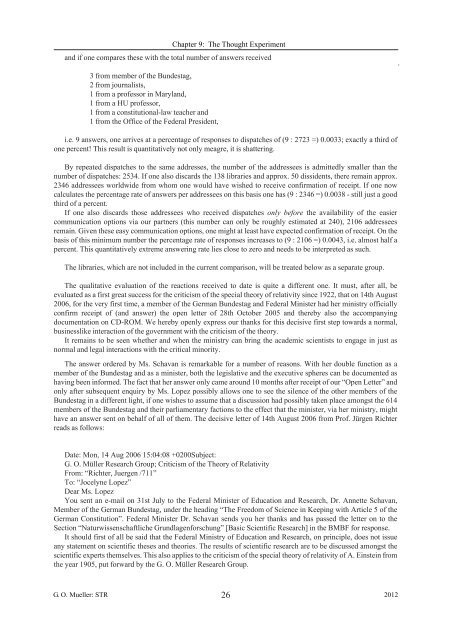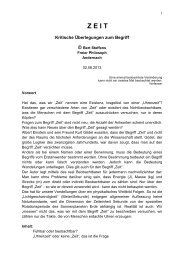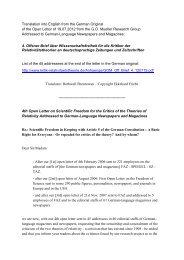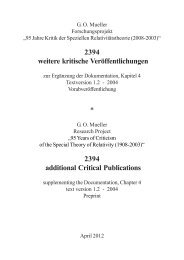1. The Need of New Approaches - Kritische Stimmen zur ...
1. The Need of New Approaches - Kritische Stimmen zur ...
1. The Need of New Approaches - Kritische Stimmen zur ...
Create successful ePaper yourself
Turn your PDF publications into a flip-book with our unique Google optimized e-Paper software.
Chapter 9: <strong>The</strong> Thought Experiment<br />
and if one compares these with the total number <strong>of</strong> answers received<br />
3 from member <strong>of</strong> the Bundestag,<br />
2 from journalists,<br />
1 from a pr<strong>of</strong>essor in Maryland,<br />
1 from a HU pr<strong>of</strong>essor,<br />
1 from a constitutional-law teacher and<br />
1 from the Office <strong>of</strong> the Federal President,<br />
i.e. 9 answers, one arrives at a percentage <strong>of</strong> responses to dispatches <strong>of</strong> (9 : 2723 =) 0.0033; exactly a third <strong>of</strong><br />
one percent! This result is quantitatively not only meagre, it is shattering.<br />
By repeated dispatches to the same addresses, the number <strong>of</strong> the addressees is admittedly smaller than the<br />
number <strong>of</strong> dispatches: 2534. If one also discards the 138 libraries and approx. 50 dissidents, there remain approx.<br />
2346 addressees worldwide from whom one would have wished to receive confirmation <strong>of</strong> receipt. If one now<br />
calculates the percentage rate <strong>of</strong> answers per addressees on this basis one has (9 : 2346 =) 0.0038 - still just a good<br />
third <strong>of</strong> a percent.<br />
If one also discards those addressees who received dispatches only before the availability <strong>of</strong> the easier<br />
communication options via our partners (this number can only be roughly estimated at 240), 2106 addressees<br />
remain. Given these easy communication options, one might at least have expected confirmation <strong>of</strong> receipt. On the<br />
basis <strong>of</strong> this minimum number the percentage rate <strong>of</strong> responses increases to (9 : 2106 =) 0.0043, i.e. almost half a<br />
percent. This quantitatively extreme answering rate lies close to zero and needs to be interpreted as such.<br />
<strong>The</strong> libraries, which are not included in the current comparison, will be treated below as a separate group.<br />
<strong>The</strong> qualitative evaluation <strong>of</strong> the reactions received to date is quite a different one. It must, after all, be<br />
evaluated as a first great success for the criticism <strong>of</strong> the special theory <strong>of</strong> relativity since 1922, that on 14th August<br />
2006, for the very first time, a member <strong>of</strong> the German Bundestag and Federal Minister had her ministry <strong>of</strong>ficially<br />
confirm receipt <strong>of</strong> (and answer) the open letter <strong>of</strong> 28th October 2005 and thereby also the accompanying<br />
documentation on CD-ROM. We hereby openly express our thanks for this decisive first step towards a normal,<br />
businesslike interaction <strong>of</strong> the government with the criticism <strong>of</strong> the theory.<br />
It remains to be seen whether and when the ministry can bring the academic scientists to engage in just as<br />
normal and legal interactions with the critical minority.<br />
<strong>The</strong> answer ordered by Ms. Schavan is remarkable for a number <strong>of</strong> reasons. With her double function as a<br />
member <strong>of</strong> the Bundestag and as a minister, both the legislative and the executive spheres can be documented as<br />
having been informed. <strong>The</strong> fact that her answer only came around 10 months after receipt <strong>of</strong> our “Open Letter” and<br />
only after subsequent enquiry by Ms. Lopez possibly allows one to see the silence <strong>of</strong> the other members <strong>of</strong> the<br />
Bundestag in a different light, if one wishes to assume that a discussion had possibly taken place amongst the 614<br />
members <strong>of</strong> the Bundestag and their parliamentary factions to the effect that the minister, via her ministry, might<br />
have an answer sent on behalf <strong>of</strong> all <strong>of</strong> them. <strong>The</strong> decisive letter <strong>of</strong> 14th August 2006 from Pr<strong>of</strong>. Jürgen Richter<br />
reads as follows:<br />
Date: Mon, 14 Aug 2006 15:04:08 +0200Subject:<br />
G. O. Müller Research Group; Criticism <strong>of</strong> the <strong>The</strong>ory <strong>of</strong> Relativity<br />
From: “Richter, Juergen /711”<br />
To: “Jocelyne Lopez”<br />
Dear Ms. Lopez<br />
You sent an e-mail on 31st July to the Federal Minister <strong>of</strong> Education and Research, Dr. Annette Schavan,<br />
Member <strong>of</strong> the German Bundestag, under the heading “<strong>The</strong> Freedom <strong>of</strong> Science in Keeping with Article 5 <strong>of</strong> the<br />
German Constitution”. Federal Minister Dr. Schavan sends you her thanks and has passed the letter on to the<br />
Section “Naturwissenschaftliche Grundlagenforschung” [Basic Scientific Research] in the BMBF for response.<br />
It should first <strong>of</strong> all be said that the Federal Ministry <strong>of</strong> Education and Research, on principle, does not issue<br />
any statement on scientific theses and theories. <strong>The</strong> results <strong>of</strong> scientific research are to be discussed amongst the<br />
scientific experts themselves. This also applies to the criticism <strong>of</strong> the special theory <strong>of</strong> relativity <strong>of</strong> A. Einstein from<br />
the year 1905, put forward by the G. O. Müller Research Group.<br />
26<br />
G. O. Mueller: STR 2012





